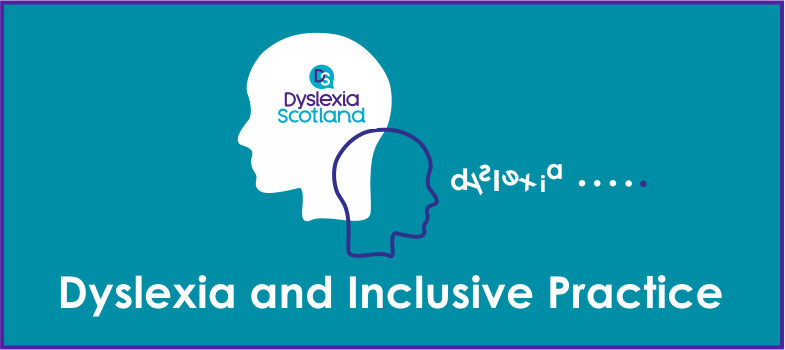1.7 Literacy, numeracy and wellbeing
Responsibility for all – Curriculum for Excellence
All staff have a responsibility to develop, reinforce and extend learning in the following areas:
- Health & Wellbeing - Some aspects of the health and wellbeing framework are the responsibility of all adults, working together to support the learning and development of children and young people.
- Literacy - All practitioners are in a position to make important contributions to developing and reinforcing young people’s literacy skills.
- Numeracy - Numeracy across learning provides essential analytic, problem solving and decision making skills across the curriculum.
Dyslexia impacts on all three areas, and will impact in varying degrees and in various ways depending on the individual learner. Staff can make a difference and support learners irrespective of the sectors or subject which is being taught.
Activity 16 Reflective questions for professional dialogue with colleagues
The following questions can be used when engaging in professional dialogue during professional learning opportunities and discussions with colleagues. The outcomes from these discussions can support planning for professional learning opportunities and improvement plans.
You can collate the responses in your reflective log. Click to 'download' a discussion sheet if required [Tip: hold Ctrl and click a link to open it in a new tab. (Hide tip)] .
- Discuss the impact you feel the “responsibility for all” duty is having on yourself and colleagues.
- Is there a connection with inclusion and ‘responsibility for all’?
Activity 17
Consider your own experience of working with learners with dyslexia and how the 3 areas of ‘responsibility for all’ impact on them and your practice.
Consider if any of the 3 areas may have a particular impact for learners who are dyslexic.
Click 'Reveal ' to see what we thought. Do note that the lists are not exhaustive.
Discussion
| Impact of dyslexia | ||
| Responsibility for All | On the learner - | On teaching practice |
The negative and positive impacts of dyslexia will vary for each learner and will be influenced by:
Learners may need to be supported and encouraged to take responsibility for their learning (age/stage appropriate). It is extremely important that they are given opportunities to build their confidence in using support strategies and understand the impact if they chose not to use them. |
All class teachers can support dyslexia across the areas of ‘Responsibility for All’. Some examples are below.
|
|
| Health & Wellbeing | Possible Negative feelings/actions
Possible Positive feelings Confidence with certain skills e.g.
|
In addition to the aspects highlighted in ‘Responsibility for All’ there is a requirement to: Be aware of the negative impact which dyslexia can have on individuals’ health and wellbeing – and that these will vary. Ensure that the learner knows that they can speak to a trusted adult Be familiar with school Support for Learning processes and Positive Relationship (anti-bullying) policies |
| Literacy | Difficulties with: expressing/demonstrating their knowledge and understanding in the written form. The acquisition of language skills – reading writing, listening and talking Grammar and spelling Organisation of writing Reluctant to read out loud or as an individual Positive aspects Very good oral presentation skills Good imagination Very good use of IT to demonstrate their knowledge and understanding Debating Drama
|
In addition to the aspects highlighted in ‘Responsibility for All’ there is a requirement to: Use appropriate IT e.g. Books for All, digital exams, use of portable devices such as tablets, dictation for learners to access information and demonstrate their knowledge and understanding
Appropriate differentiation |
| Numeracy | Working memory and processing difficulties may manifest as difficulties with:
Language of math Acquisition of number bonds and mathematical concepts Rote learning – e.g. times tables Problem solving Orientation The learner may feel that they are not good at numeracy/math and that they will not improve.
Positive aspects Some learners do not experience difficulties with numeracy Learners can develop helpful strategies to help them remember mathematical concepts. |
In addition to the aspects highlighted in ‘Responsibility for All’ there is a requirement to develop an awareness and understanding of the links between dyslexia and numeracy and that:
Assumptions are not made that the learner really does understand mathematical concepts which were taught in earlier levels. They may be masking this.
Not all learners with dyslexia experience difficulties with understanding more complex mathematical concepts.
Appropriate supports/resources are available for the learner to access to help them with numeracy. E.g. personal number square, phones, calculators, rulers, displays on the walls or personal planners.
|
1.6 Language development
